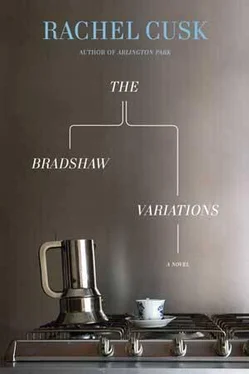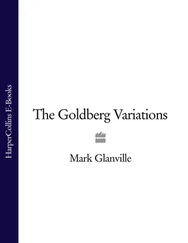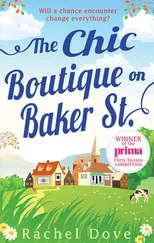‘Claude!’ he calls. ‘Are you there, Claude?’
‘Yes!’ she shouts back.
Howard’s parents stand a short distance away. The sound of the engine has caught their attention. Their faces are perfectly composed. She realises that they are used to it, used to whatever it was she witnessed on the path. It was not, as she thought, an emergency. What she saw was much worse: it was intimacy.
‘Claude! I need you to guide me out!’
Lewis rolls down the window and puts his head out. ‘Dad’s let the air out of the tyres!’ he cries, delirious with excitement.
Slowly the car begins to reverse out of the garage. Claudia watches as it clears the doorjamb by the slenderest of margins. She feels it, its impossible passage, as she seems to have felt so many things in her life with Howard. It is all, very nearly, impossible. She shakes helplessly with strange, silent laughter.
‘Careful!’ she calls in a strangled voice, when the lamed wheels meet the slight rise of the concrete floor where it gives out on to the driveway.
The car judders a little and rolls back. Howard puts his foot harder on the accelerator. On the periphery of her vision Claudia sees the white darting shape of Skittle. He tears down the path towards the car, his body making its strange contortions as he runs. In an instant he is there behind the wheels. While she watches, he plunges his nose into the exhaust pipe and shudders ecstatically, inhaling the black fumes.
‘Howard!’ Claudia shrieks.
She sees the dog fall unconscious on to his side. A moment later, the revving engine forces the wheels over the concrete rise and the car comes in one movement out of the garage, thudding over Skittle and rolling him stiffly into the darkness beneath its belly. There is a pause, and then another thud as the front wheel goes over the body.
‘Oh, mind the dog!’ calls Ma. ‘Do mind the dog, Howard!’
The car shakes to a halt. Howard leaps out. He runs around to the front and kneels over Skittle’s body where it lies in the dirt, a thread of blood at the corner of the mouth.
‘Poor boy,’ Howard says, shaking his head. ‘Poor old fellow.’
One by one the children emerge from the back of the car. Lottie is crying. Lewis looks white and stricken.
‘There were two bumps,’ Martha says significantly to her mother. ‘First there was one bump. Then, a little while later, there was another bump.’
‘Is he dead?’ Lewis says.
‘I’m afraid so,’ says Howard tenderly.
‘ Two bumps,’ Martha repeats, to herself. ‘First one bump, then the other.’
Howard grips Claudia’s hand. She sees that his eyes are red with tears. Ma and Dads approach the family where they stand in a circle.
‘Oh dear,’ Dads says, looking down at the small body. ‘That was a shame.’
‘It’ll make life easier for you, at least, over the next couple of weeks,’ Howard says grimly.
‘I suppose it will,’ Dads says.
‘I was looking forward to him coming!’ Ma says. ‘You make it sound as if it were nothing but a nuisance! But I was looking forward to it!’
Lottie starts to cry again.
‘Well,’ Dads says presently. ‘If there’s nothing else we can do, we may as well be on our way.’
Howard stands and faces his parents. The dog lies on the ground between them. His body imparts a finality to it, to Howard as he faces them in their coldness. It is as though, with this offering of death, he is freeing himself of his obligation to them, freeing himself from the curse of their sterility.
‘Goodbye,’ he says, embracing first his father, then his mother. ‘See you soon, I expect. Goodbye.’
Howard and Claudia bury Skittle in the back garden. They agree the dog was too much for them. They agree that they were, in this case, overstretching the mark. For all the work of a dog, Claudia observes, they might as well have had another baby.
Then they get the children in the car and drive like the wind, hoping to make the boat.
On the train, Thomas thinks about money. He has always had enough of it, enough money. Then, for a year, he earned nothing at all. Now the money is flowing again. What is money?
‘Excuse me, is this seat free?’
He looks up. A girl is standing there. She wants to sit down, but his briefcase is in the way.
‘I’m sorry,’ he says, putting the briefcase down by his feet.
‘That’s all right,’ she says. She is extremely serious, forgiving him. She sits down and gets out sheaves of papers, a laptop computer. She begins to type rapidly with her varnished fingernails.
Money is a representation — strictly speaking, it has no authenticity. It may be that the value of a thing decreases in proportion to the power of money to represent it. The girl beside him is wearing a diamond ring on her wedding finger, in a big gold setting. The diamond is worth a lot of money. Yet it has less value than almost anything Thomas can think of. If that girl lost her finger, it would upset her far more than losing her diamond. But her finger isn’t worth anything at all.
All the same, there is danger in a life that is of high value but little worth. There is a vulnerability that comes with the absence of representation. That girl’s ring represents the fact that she is loved. But the things that Thomas has lost he has no proof of. He has nothing to show for himself, for the days that left no money-trace behind them but simply vanished, like the days of an unrecorded civilisation. He looks out of the window at the passing countryside. He wonders whether Tonie felt this once; whether she sat on this train, a year ago, and pondered the life that had vanished like smoke behind her, its love and its hours, its uncommemorated emotions. And then coming back to find Thomas in the space where she used to be, like returning to a childhood home and finding new people living there. Thus he returns to Tonie at the day’s end, and finds her intimate with what no longer belongs to him. He has noticed that Tonie tidies around the piano with particular care, dusting the closed lid, making tiny adjustments to the already orderly stacks of music books. He does not play the piano any more. Sometimes she puts flowers in a vase on the top. He sees them and laughs. It is ghoulishly touching, like the sight of a well-tended grave.
On the evening train he falls asleep, his cheek pressed against the glass. It is September, and still light. He walks home from the station. He thinks of what will happen when he gets there. Usually Tonie is solicitous of him in the evenings. She fusses around him and talks animatedly. In the mornings she is more silent, slightly rigid. It is as though she has to make it up in its entirety every day, the story of her love for him. In the morning the page is blank. He sees her watching Alexa with red-rimmed eyes that nonetheless are dry, her manner devotional and slightly shrill. Tonie has never asked him to account for what he did the day Alexa got ill, just as he has never asked her where she was that evening. There has been an exchange of territories, ratified by a treaty of silence. She did not return to work, not even for a day. She donned the plain garment of motherhood, there in the hospital. She was alone when they told her that Alexa had lost the hearing in her right ear. She had sent Thomas home to sleep, to make arrangements, to be male again. Perhaps she has forgotten that he was ever there at all.
Sometimes, in the evenings, they look at one another with eyes that seem to Thomas to be full of guilt. These looks are accidental: their roaming eyes meet, surprised, and for an instant something new discloses itself, a new separation between them, as though they are strangers whose eyes are meeting for the first time. The guilt is the guilt of experience, which only strangers admit to one another. Yet quite what they are guilty of they will never say.
Читать дальше












